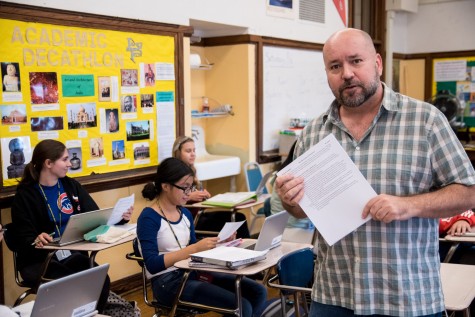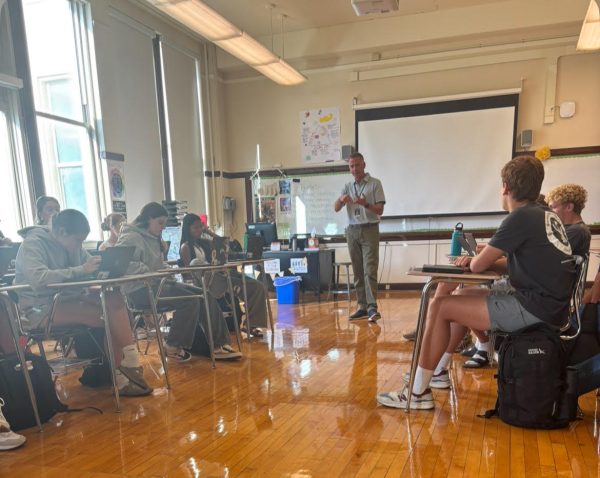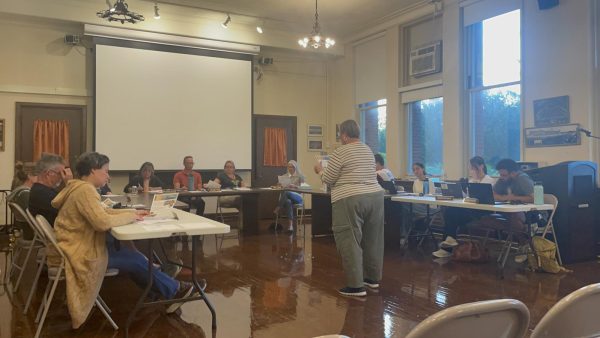Freshmen in (A P)anic over new school curriculum

Mr. Stepek smiled proudly as he pushed away his papers and folded his hands. The look on his face had changed from focus to awe. He was ready to brag about his new students.
“I think that we will have some of the smartest kids in the city,” Stepek said, explaining his view of the introduction of AP Human Geography to the freshman curriculum.
Advanced Placement (AP) classes are opportunities created for high school students to undergo a year of studying under a college curriculum in order to gain credit for their continued education.
Lane students have been required to take at least one AP class as a graduation requirement. It was not until the 2015-2016 school year that freshmen were offered an AP major. Rather than taking Regular or Honors World Studies, freshmen are now taking either Honors World Studies or AP Human Geography.
“The decision of who takes which classes is based on the entrance exam, just as before. Now instead of deciding regular or honors, it decides AP or honors,” Ms. Hanly, assistant principal, said.
This AP major came after close consideration of what course would be a good fit for freshmen and how it would lead to long term success.
AP Human Geography is the only class approved by the College Board to be taught to freshmen. Administration and teachers alike acknowledge the challenges that this may pose to students.
“It’s obviously intimidating to them. They are in a rough period in transition to high school,” Stepek said.
In a survey distributed to freshman AP Human Geography students, a majority reported that they were intimidated by the class.
Students are not the only ones making adjustments — Stepek has adjusted his classroom to accommodate his students.
Teachers understand that students all have different methods of note-taking and essay writing from their various schools, he said. “Kids are coming from all over the city, and we don’t know what curriculum has been covered,” Stepek said.
Even facing these challenges, teachers remain hopeful and confident in students and their ability to succeed.
“It’s a great opportunity for these students to further develop skills like time management and studying,” said Ms. Anderson, who was Lane’s AP Coordinator before recently being named principal.
Students also share the belief that this class will prove to be an important asset for their learning. Teaching proper note taking, study skills, and time management were all highlighted as benefits in survey responses.
“This class will help them in other social science classes, as well as AP classes across the board. They are valuable skills for their classes. I think they will grow from the experience,” Stepek said.
Although a positive opinion was abundant in the responses, there was also a significant number of students who reported concerns. Many of the concerns circulated around the drastic change in rigor and from being unaware of what to expect.
The students all responded with varying opinions, but are providing insight for administration on the benefits and drawbacks of this implementation.
“We are going to constantly evaluate opinions of both teachers and students, grades, and test scores. That is how we will know where to go from here, changes to make to the teaching, or if the course needs to be eliminated from the freshman curriculum,” Anderson said.
Your donations directly fund the Lane Tech student journalism program—covering essential costs like website hosting and technology not supported by our school or district. Your generosity empowers our student reporters to investigate, write, and publish impactful stories that matter to our school community.
This website is more than a publishing platform—it's an archive, a research tool, and a source of truth. Every dollar helps us preserve and grow this resource so future students can learn from and build on the work being done today.
Thank you for supporting the next generation of journalists at Lane Tech College Prep!






